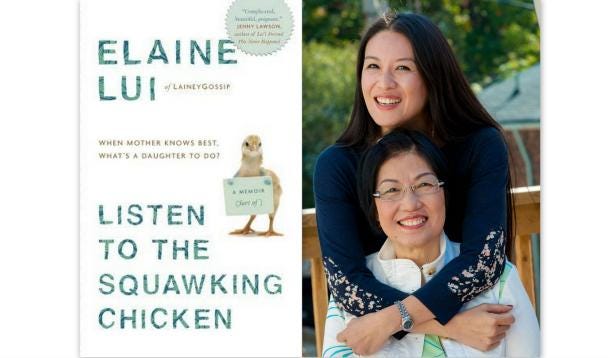How to Stay Creatively Fresh
Six tips from the Canadian broadcaster who went from obscurity to the Oscars after she started writing a newsletter to two friends.
“Ross did not deserve Rachel!”
A friend of mine has been lamenting about this for as long as I’ve known him.
I usually shake my head and laugh at how 20 years since the finale, he’s still at war with FRIENDS.
Like most fans, I’ve never entertained the idea of Ross and Rachel not ending up together.
But this past Monday, I finally did.
I was tuned into an interview with Lainey Lui—a Canadian broadcaster whose fashion flair and sharp writing catapulted her from obscurity to the Oscars.
Lui writes a high-traffic blog, appears as a senior correspondent on Etalk—the leading Canadian entertainment news program, and previously co-hosted The Social—a Canadian daytime television talk show.
The woman knows how to craft good stories and according to her, Ross and Rachel’s long-awaited reunion went against a key writing principle.
Lui says “Good stories give people what they need, not necessarily what they want.” But she says most people struggle with this “because we all want to be liked.”
That doesn’t change the fact that:
“Good stories take hard turns.”
Using FRIENDS as an example, Lui described Ross and Rachel's reunion as a “fan service.”
Showwriters gave the fans what they wanted rather than the more realistic outcome of Miss Popular and Doctor Dinosaur not being suited for each other.
As Lui pointed out, “You don’t know what you need until you’ve sat there and processed it.”
She reasoned that 20 years after the series finale, people are more likely to entertain the thought that Ross and Rachel should not have ended up together.
But back in 2004?
Lui says, “People would’ve thrown me out of the building.”
Happy endings don’t always come down to getting what you want.
As many of us learn the hard way, sometimes what we thought we wanted doesn’t measure up to our expectations. Likewise, by loosening our grip on the future and being open to redirection, we often end up getting more than we’d hoped for.
Both scenarios require “hard turns” so it makes sense that great storytelling calls for a similar trajectory.
My Experience Writing About “Hard Turns”
I published my first online post in February 2021.
I wrote about my first career “failure” (getting rejected from law school) and how I reframed it as an opportunity to pursue my dream of moving to London.
I was nervous about posting my story for two reasons.
Firstly, I thought people would think less of me for failing to achieve a goal I’d set for myself, and secondly, I had never posted an article online and my writing was sorely out of practice.
So I asked several friends and family members to read my draft and offer feedback.
The unanimous piece of advice was to create a bigger gap between “everything going wrong” and “everything falling into place.”
My readers wanted to experience the “hard turn” rather than have me glaze over it.
After all, that’s where the story unfolds and the character is built, right?
Later that year, in October 2021, I rewrote the article with additional feedback from my writer peers.
I noticed a huge improvement and now that I’m rewriting it a third time as I incorporate it into my book, I’m working on expanding the hard turn even more.
Stay tuned for more updates.
In the meantime, here are six principles inspired by Lui’s interview on how to stay creatively fresh.
6 Principles to Stay Creatively Fresh
1. Don’t let numbers deter you
Lui’s story: 50-year-old Lui’s rise to the ranks of Oscar red carpet coverage began rather humbly when she started writing a fashion-focused newsletter to two girlfriends at 29.
Those two women forwarded her newsletter to more friends and her readership grew exponentially from there.
Within two years, Lui had amassed thousands of subscribers and a Canadian broadcasting company was eager to work with her. As a result, Lui launched her broadcast career at age 31 and she’s been a member of the elite entertainment scene ever since.
My story: I started writing my newsletter to a handful of subscribers at 31. Unlike Lui, my growth has been slow and has not led to any life-changing career offers.
However, writing weekly for the past three years has brought me a deep sense of joy and fulfillment. It’s simultaneously sharpened my thinking, enhanced my self-awareness, and boosted my creativity.
As you can see below, I just crawled my way back to 500 subscribers after cutting my list by 65% (roughly two-thirds) from 1,070 to 379 in January:
Despite having a small readership, I've met some incredible people through sharing my journey and deepened existing relationships with family and friends who've shared their stories in return.
2. Do things that improve your relationship with yourself
Lui’s story: Lui’s “sort of” memoir is called Listen to the Squawking Chicken: When Mother Knows Best, What's a Daughter To Do?
So naturally, the interviewer asked, “Has your book changed your relationship with your mother?”
Lui said “No, but it changed my relationship with myself and what’s possible for me.”
My story: I recently started working on my first book and I resonate with Lui’s assertion that it’s “so hard” but more importantly, that it’s changing my relationship with myself and what’s possible for me.
Things are only going up from here.
3. Crusade for your favourite art forms
Lui’s story: Lui says a big part of staying creatively fresh for her is resisting trends she doesn’t agree with. Take, for instance, the current 15-second fad.
“Everyone’s obsessed with small bites,” she says.
But as a self-described “long talker” who prefers “long-form journalism and long-form writing,” Lui says she’d rather crusade on behalf of longer stories.
While she admits some people can skillfully relay a story in 15 seconds, most people cannot. Not to mention, it reinforces micro-short attention spans which she regards as a disservice to all.
My story: I relate to Lui’s take. When it comes to writing platforms, I prefer Substack’s long-form content over Twitter’s short-form equivalent. Granted long-form writing attracts far fewer readers, I prefer the depth of experience for myself and my readers.
4. Start somewhere (even if that place “sucks”)
Lui’s story: Lui’s most valuable lesson in writing has been “You can’t fix nothing.” She explains that people get “bogged down by blank pages” because they want their draft to be good from the start.
But any writer can attest that great writing is born through rewriting, and to rewrite you need to start somewhere.
Lui’s advice is best illustrated by author Anne Lamott’s concept of “shitty first drafts” where you embrace your first draft as a messy starting point with the sole goal of getting something down so you can refine it.
It’s further supported by writer Julian Shapiro’s “Creativity Faucet” which is best explained in his own words, below:
Lui’s take on first drafts is “Something bad can be fixed” and “The start will always suck.”
Reflecting on her book-writing journey, Lui says everyone needs at least five drafts. Her book went through six or seven. The key is to “keep constructing and reconstructing.”
And bear in mind she writes 3,500 words a day.
Chances are those of us writing less will need even more drafts. So embrace the process. As Shapiro wrote of Mozart and Edison, nobody’s scoring you based on your input-to-output ratio.
My story: I wouldn’t be hitting 149 weeks of publishing today, let alone writing a book, if I hadn’t wholeheartedly embraced the messy first draft approach. It’s been three years and it hasn’t failed me yet.
5. Work with your friends
Lui’s story: Despite being told repeatedly, “Don’t work with your friends,” Lui shares the opposite advice with creatives.
“Group chats over comments,” she says.
Lui has friends she’s been writing with for 15 years, having not only exchanged feedback but contributed to each other’s sites in that time.
Her creativity is largely fueled by “being around people who are always going to ride for me.”
My story: My writing journey took flight when I found a community of writers to support me through the exchange of ideas and feedback. That community, as I’ve mentioned many times, was Write of Passage.
Their support was essential early on whereas nearly three years in, I tend to self-edit and send.
I know my writing would be better if I prioritized feedback but I don’t have the bandwidth to seek it out at present so instead, I simply ask for it when I’m stuck.
I can always count on my writer friends to get me moving again.
6. Take breaks as part of your creative process
Lui’s story: Lui recalled how it took her far too long to appreciate the importance of “taking breaks” to stay creatively fresh. She used to pride herself on being able to work the hardest and longest.
During peak periods—like awards season—she could run on as little as two hours of sleep and still crank out a blog or memorize a TV script.
But she’s since realized that creatives need to prioritize rest the same way athletes do. That means taking breaks, getting enough sleep, and generally having guardrails around how and what you do.
My story: I’m no stranger to burning myself out. In the past, I’ve let my obsession with work and creative projects (like writing) plow through every gate-like boundary leaving me exhausted amid the rubble. (I wrote more about this in a post called Burnout & The Paradox of Giving Up.)
But since then, I’ve learned the value of taking proper breaks. I don’t plan on burning out ever again and I’ve realized that by incorporating breaks into my routines, I wind up having more creative energy to write (hence finally starting my book).
Cheat Sheet For Creatives
To recap, here are 6 principles to stay creatively fresh:
Don’t let numbers deter you
Do things that improve your relationship with yourself
Crusade for your favourite art forms
Start somewhere (even if that place “sucks”)
Work with your friends
Take breaks as part of your creative process
I hope these principles inspire you to pursue your creative passion. You never know, it might be your ticket to the Oscars (or some other dreamy place).
Thanks for reading and have a wonder-full week,
P.S. I texted my friend after watching Lui’s interview to inform him a reputable broadcaster was in his camp on the Ross and Rachel matter. He sent back this meme (along with another assertion about how unrealistic the plot was):









